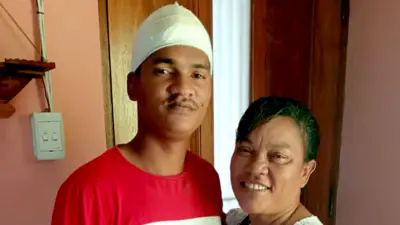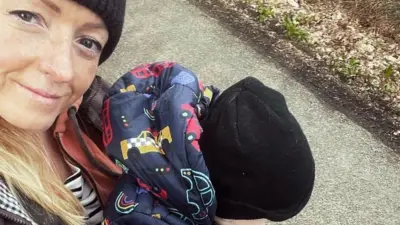We've updated our Privacy and Cookies Policy
We've made some important changes to our Privacy and Cookies Policy and we want you to know what this means for you and your data.
NHS failure to probe deaths 'shocking' - Jeremy Hunt
The government is "profoundly shocked" by a report which found the NHS failed to investigate the unexpected deaths of more than 1,000 people, Health Secretary Jeremy Hunt has said.
He spoke to the Commons after the BBC revealed the findings of an NHS England report into mental health patients at Southern Health NHS Foundation Trust.
He offered a "heartfelt apology" to families affected.
Southern Health said it had made "substantial improvements".
Mr Hunt described the findings of the report - which was commissioned by NHS England and carried out by Mazars, a large audit firm - as "totally unacceptable".
'Shocking revelations'
Southern Health is one of the country's largest mental health trusts, covering Hampshire, Dorset, Wiltshire, Oxfordshire and Buckinghamshire, and providing services to about 45,000 people.
The leaked report, which was passed to BBC News, looked at all deaths at the trust between April 2011 and March 2015. During that period, it found 10,306 people had died. Most of these deaths were expected but 1,454 were not.
Of those, 272 were treated as critical incidents, of which just 195 - 13% - were treated by the trust as a serious incident requiring investigation (SIRI).
Image source, Sara Ryan
Mr Hunt told the Commons there was an "urgent need" to improve the investigation and learning from the estimated 200 avoidable deaths that happen every week across the NHS system.
He outlined a three-point plan to try and improve the situation. This included:
- From June 2016, bringing in "Ofsted style" ratings for all 209 Clinical Commissioning Group areas in England
- The University of Bristol is to carry out a study into the mortality rates of people with learning disabilities in NHS care
- Mr Hunt also reiterated his commitment to publish, from next year, the number of avoidable deaths by NHS trust
Labour's shadow health secretary Heidi Alexander described the findings as "truly shocking revelations".
The report was ordered in 2013, after 18-year-old Connor Sparrowhawk drowned in a bath following an epileptic seizure while a patient at Southern Health hospital in Oxford.
An independent investigation said his death had been preventable, and an inquest jury found neglect by the trust had contributed to his death.
'Tip of iceberg'
His mother, Sara Ryan, told BBC News earlier the behaviour of the trust was "barbaric".
"I can't express how shocked we were, we had no idea at the level of disregard and disinterest that Southern Health were demonstrating towards a group of their patients," she said.
"Scrutiny should be put on other trusts across the country to see if this is common practice, you know, it's absolutely barbaric."
Beverley Dawkins, who was an adviser to the report, said its findings were "just the tip of an iceberg".
"Until there is a proper ongoing mortality review we won't understand the scale of the problem," she said.
Key findings from the report
- The trust could not demonstrate a comprehensive systematic approach to learning from deaths
- Despite the trust having comprehensive data on deaths, it failed to use it effectively
- Too few deaths among those with learning disabilities and over-65s with mental health problems were investigated, and some cases should have been investigated further
- In nearly two-thirds of investigations, there was no family involvement
- The report blamed a "failure of leadership" at Southern Health NHS Foundation Trust
The report also found that the likelihood of an unexpected death being investigated depended hugely on the type of patient.
The most likely group to get an investigation were adults with mental health problems, where 30% were investigated.
'Unfinished business'
For those with learning disability the figure was 1%, and among over-65s with mental health problems it was just 0.3%.
The average age at death of those with a learning disability was 56 - over seven years younger than the national average.
Even when investigations were carried out, they were of a poor quality and often extremely late, the NHS England report, which is yet to be officially published, said.
Mr Hunt told the Commons the culture change required in the NHS remained "unfinished business" from the Mid Staffs scandal.
"The fundamental question that we all need to reflect on is why is it that we don't currently have the right reporting culture in the NHS when it comes to unexpected deaths," he said.
Health Select Committee chairwoman Sarah Wollaston described the report's findings as "deeply disturbing" and welcomed the measures announced by Mr Hunt, particularly the pledge that it will not be treated as an isolated incident.
'Shine a spotlight'
Southern Health NHS Foundation Trust said it accepted its processes "had not always been up to the high standards our patients, their families and carers deserve".
"However, we have already made substantial improvements in this area over a sustained period of time," a spokesman added.
"These issues are not unique to the trust and we welcome the opportunity to shine a spotlight on this important area.
"Though the trust continues to challenge the draft report's interpretation of the evidence, our focus and priority is on continuing to improve the services we provide for our patients."
NHS trust 'failed to investigate hundreds of deaths'
The NHS has failed to investigate the unexpected deaths of more than 1,000 people since 2011, according to a report obtained by BBC News.
Top Stories
Features & Analysis
Most read
Content is not available








